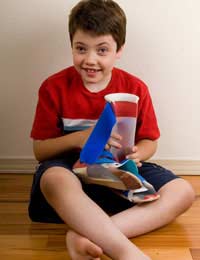Cerebral Palsy

Cerebral palsy is a medical condition that results from a brain injury that was either sustained before, during or very shortly after an individual’s birth. One of the main characteristics of cerebral palsy is a lack of muscle control, including the muscles involved in the production of speech. Though this condition is not progressive, that is it does not necessarily get worse as time goes on, the characteristics and effects may change over a given time period.
Speech therapy may be helpful in teaching individuals with cerebral palsy how best to control the jaw and face muscles, as well as devise more creative means of communicating for those who are unable to speak.
Cerebral Palsy in the United Kingdom
In the United Kingdom, cerebral palsy affects one in approximately every 500 births. Three main types of cerebral palsy exist. Spastic cerebral palsy is characterised by tight, stiff or weak muscles. Athetoid cerebral palsy is characterised by spontaneous movement of the muscles. Ataxic cerebral palsy is characterised by imbalance and/or shaky of the hands and feet. Sometimes mixed cerebral palsy is also considered a common type. The severity of each case of cerebral palsy, regardless of the type, depends upon the part of the brain affected by injury and the severity/extent of the injury.Cerebral Palsy and Speech
Depending upon the type of brain injury, the location of the brain injury and the severity of the brain injury that resulted in cerebral palsy, speech may be affected only slightly or made entirely impossible. Comprehension can also be affected by cerebral palsy, with some individuals able to comprehend as expected for their age and some coping with a learning disorder that makes comprehension slow or difficult. Unfortunately, some severe cases may result in few, if any, verbal communication skills and little comprehension.Cerebral Palsy and Speech Therapy
Speech therapy can have a great impact on the speech and language abilities of individuals with cerebral palsy. Speech therapists will be able to help individuals strengthen the face and mouth muscles used for verbal communication, as well as develop better muscle control in these areas. If individuals are unable to verbally communicate, speech therapists will be able to introduce communication aids such as books, charts or computers, or possibly even teach sign language, that will allow the individuals to communicate through alternates to verbal speech.Depending upon the type of communication that will be practiced, therapists and clients may engage in vocabulary building exercises and activities to learn or correct grammar. At the same time, speech therapy helps to sharpen individual’s listening skills, meaning that both giving and receiving verbal communications may become more efficient as a result.


Re: Augmentative and Alternative Communication
Kak esehiko sminor k112 speechdisorder.co.uk
Re: The Lidcombe Program
My 3 year old has started to stammer about 5 weeks ago and has progressed very fast and now it affect every word she pronounces and I am…
Re: Child Abuse and Speech Disorders
I stopped talking to my dad in my normal voice when I was in grade 1 after he hit me because I couldn’t understand my…
Re: New Earpiece to Help With Stammering
I am interested in being assessed for the use of the SpeechEasy hearing device and would be grateful if someone could…
Re: The Lidcombe Program
I don’t know what else to do ..
Re: New Earpiece to Help With Stammering
I have a Stammer and have always struggled with my speech and I think this would really help me and so many others.
Re: The Lidcombe Program
Sir I only stutter when speaking to others. Not when, I speak to myself can you tell me what's the problem.
Re: The Lidcombe Program
I am 23 years I am supering from stammer please how can I get vaccine for ti
Re: Expressive Language Disorder
I have a lot to ask . Please reach out. Thank you
Re: The Lidcombe Program
My age is 32...when IAM speaking difficulty to say word...IAM disappointed in my life only reason is stammring..plz help me...